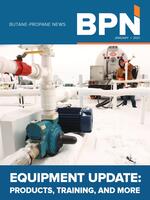
COVID-19 has added an element of uncertainty that promises to make the next five months even more challenging for propane marketers than normal.
“Managing through a COVID-19 Winter” was the topic of a webinar held Nov. 19, co-hosted by four firms that are prominent in the propane and heating oil industries. The webinar was attended by more than 400 people. The panelists delivered insights from within their fields—marketing, delivery optimization, accounting, and business acquisitions.
Among the issues they highlighted were the following:
Institute A Delivery Fee
If you don’t already have one, and it’s legal in your state, it’s time to institute a delivery fee, said Rich Goldberg, president of Warm Thoughts Communications (Clifton, N.J.). COVID-19 has increased costs and decreased operating efficiency. Plus, marketers may still run into payment issues as unemployment becomes more permanent. Marketers need to build a greater cash cushion. Goldberg has worked with companies that expected pushback when they started adding $4.95 (oil) or $8.95 (propane) per delivery. “It never came,” he reported. “They made tens and in some cases hundreds of thousands of dollars, which is a gift that keeps giving every year.”
Fear of customer objection is always overblown, Goldberg said, as long as you implement it in a smart way and don’t push it too high. He suggested being upfront rather than hiding it. Send a letter announcing the fee to all customers and giving a good rationale for why you are doing it. If you are worried about pushback, test it with a smaller group of customers first (although he says he has never had to back away from larger rollout after a test). Train your customer service people on how to discuss it if anyone asks, and waive the fee if necessary for the small percentage of customers who complain. In the letter, he suggests, identify ways your customers can save more money by upgrading to certain programs like autopay, e-bill, budget, service plan, auto-delivery, etc. He added that for the typical customer who receives three, four, or five deliveries a year, a year’s worth of delivery fees will cost the same as breakfast for the family at Denny’s. “This is not why they are choosing to stay or leave your company.”
After the webinar, Goldberg told BPN that airlines, hotels, Airbnb, etc., have demonstrated that fees are a good way to increase cash flow. Fees only become an issue if companies pile them on too high. “Americans have shown that when they are shopping for something, price matters more than ‘nuisance fees.’”
“Also, the fee is more ‘weather resistant’ than price per gallon increase,” he added. He explained that if gallons are off, the price increase is watered down, and if other companies lower their price or increase new customer incentives, that puts additional pressure on price per gallon for every company in the market.
“If anything, most propane companies undercharge for the services they provide, inefficiencies they are subject to, and risk they undertake,” Goldberg concluded. “So, if you can use both fees and price changes, you stand a better chance of meeting your revenue needs. But it is very important to give customers a reasonable rationale when implementing it.”
Don’t Top Off Tanks
“It’s going to sound counterintuitive, but, don’t simply top off the tanks; the results might hurt,” said Phil Baratz, CEO and founder of Angus Energy (Fort Lauderdale, Fla.). Speaking at this Nov. 19 webinar, he acknowledged that some marketers might have extra capacity at that time of year and may not feel they could be hurt by topping off tanks. He then added that doing so would create a future false peak for your delivery operations and require deliveries that would have been made in February or March to be made in January, when demand is already at its highest. Marketers should look at all deliveries for the year, just as they budget for an entire year. “Each time you make a delivery, it’s going to impact the delivery that follows, and the delivery that follows that,” Baratz explained. “Topping off tanks today will result in no runouts tomorrow, but it could really wreak havoc on your system going forward.”
During a Q&A that followed the presentations, an attendee suggested it might be best to get ahead now in hopes of preventing a problem later. Baratz answered, “I can give you a crazy example to make a point. If every single one of your tanks were magically filled today, what would you do tomorrow? And, forgetting that, what would you do 60 days from now when they all need to be filled up again?” Instead, he suggested, “you need to be strategic about it.”
After the webinar, Baratz told BPN, “The notion of topping off tanks has always been there, but with everything logistics-related being under the microscope this year, I can definitely see some companies looking at this more closely.”
He added that increasing summer deliveries in order to get better allocation of winter product from suppliers is a different issue. “It is not uncommon for suppliers to ‘award’ winter volumes based on summer purchases. If that is the case, the idea of a summer fill program has clear benefits and needs to be considered in light of all other logistic and financial consideration. Still, this type of ‘fill’ is very different than just filling up tanks randomly in November or December if those tanks are not in need of a delivery.”
Generate Cash Flow
Marty Kirshner, director and chair of energy practice at Gray, Gray & Gray LLP (Canton, Mass.), noted the importance of cash flow in being prepared for the costs and risks of COVID. “A lot of these costs for PPE and things, there’s got to be a way to recover it, because it’s new expenses that you didn’t anticipate,” he said.
He reiterated the value of a delivery fee and outlined several other ways to improve cash flow. Among them: work to get all your customers on credit card payment; offer special discounts to some who are slow to pay; collect payments once they have gone over 30 days; pay vendors on the last day allowed in your payment terms; get on an electronic platform for billing and payment; do a physical inventory of parts in your warehouse and trucks, so you don’t buy parts you already have; review your insurance coverage, so you’re not paying to insure any trucks, office space, or people that are not being used, and refinance any loans on which you are paying above market interest rates. “There’s no magic wand that is going to make cash fall from the sky,” Kirshner concluded, “so these are the kinds of things you need to do.”
While things like collecting receivables and stretching payables would apply to all small business, the delivery fee, reviewing insurance coverage, and getting people on credit card payment are more specific to propane and heating oil companies, he told BPN after the webinar. “I am making a point to emphasize these topics now as we are in the winter and one bad decision could lead to a domino effect of following issues,” Kirshner explained. “Cash is king in this current environment and you need to be in the best cash position possible to be able to flexibly navigate through these next few uncertain months or you will be in trouble. You can’t rely on banks right now the way you used to.”
Focus On Business Value Drivers
Steven Abbate, managing director of Cetane Associates (Kent, Conn.), displayed a list of 20 value drivers and highlighted five that had been affected by COVID. First, customer makeup. The pandemic has had very different effects on marketers who serve residential customers and marketers who serve commercial customers. “You really need to understand your customer makeup now, more so than ever, to better understand the value of a business.” Second, COVID compliance. “If this company is not following these protocols, a buyer would come in and find themselves in a disastrous situation very quickly.” Third, competition for assets. The competition in the business acquisition market has become greater; he reported that Cetane has gone from 5.2 offers to 5.8 offers on the firms its represents. Fourth, adequate number of drivers and technicians. This issue has been highlighted even more during COVID. “One of the first questions we are asked is, ‘Are they fully staffed?’” Fifth, Abbate added, is accounts receivable aging. “People want to look at 30, 60, 90—what does this business look like?”
These are just some of the takeaways offered during the webinar. Goldberg also shared best practices of clients Warm Thoughts serves in the propane, heating oil, and HVAC industries and discussed minimizing employee risk, crisis leadership, improving customer communication, planning for what-ifs, and making lemonade out of lemons. Baratz covered issues related to delivering fuel, including imperfections of deliveries based on K-factors, planning what to do if some of your drivers need to quarantine themselves, the value of remote tank monitors, and defining “needing a delivery.” Kirshner gave an update on Paycheck Protection Program (PPP) loan accounting and cybersecurity. Abbate outlined current business valuation dynamics, what has changed since COVID, and the current acquisition environment.
To view the 96-minute webinar, visit warmthoughts.com/managing-through-a-covid-19-winter/.


